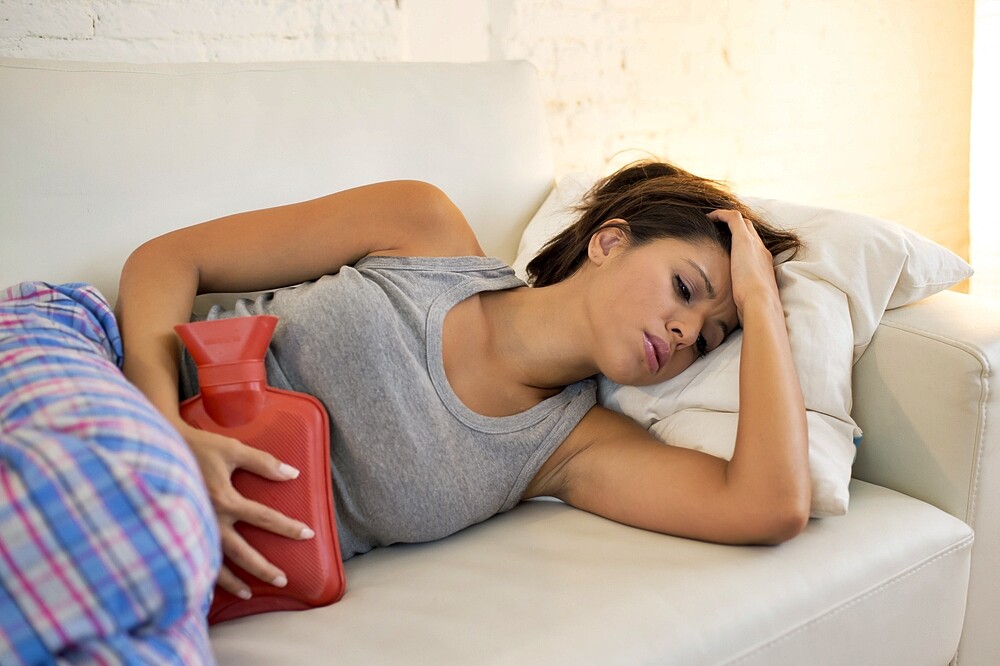Menstrual pain can be gently relieved. The best tips against stomach cramps, back pain, nausea – so that the “days” do not become a torture.
Painful Menstrual Periods: What is that actually?
On average it happens every 28 days: If no fertilised egg is implanted in the uterus, part of the mucous membrane is broken down and the remains are rejected – menstruation occurs. For many women this is an event that is accompanied by pain in the abdomen and back, especially in the first one or two days of the menstrual cycle.
“Dysmenorrhoea” or “algomenorrhoea” – this is the medical term for period pain. If they occur repeatedly and are very severe, there may be a disease or disorder behind it that needs treatment.
Who gets period pains?
When women are under constant stress or overexert themselves physically, this can lead to painful cramping of the abdomen.
Women with a narrow cervix often suffer from period pains. Also affected are women with gynaecological diseases or disorders, such as inflammation of the uterus or fallopian tubes, adhesions on the fallopian tubes and ovaries, myomas or endometriosis.
Which complaints should make me pay attention during menstruation?
As a rule, there is pulling pain in the back and abdomen, often abdominal cramps occur. Sometimes those affected also suffer from headaches, nausea, a feeling of fullness or diarrhoea.
How does the doctor determine if I have period pain?
If a woman suffers from menstrual cramps, this is already clear in a conversation with the doctor. However, it is more difficult for the doctor to clarify the cause of the complaints. Palpation and ultrasound examinations, among other things, can help here.
How can I treat period pains?
Painkillers such as Buscopan offer quick help against acute menstrual pain – but they do not eliminate the cause of the menstrual pain. The pill helps to regulate the hormone balance, which often makes the symptoms disappear or at least relieves them. A sufficient dose of magnesium (600 milligrams a day) has a relaxing effect.
In addition, the doctor will check whether a myoma or endometriosis, for example, is causing the pain. If this is the case, the therapy must start there.
Which gentle healing methods help with period pains?
- Medicinal tea made from lady’s mantle, chamomile and goosefoil helps to relieve cramps. Scald a tablespoon of the mixture (one third of each herb) with a cup of hot water and let it steep for 15 minutes. A warm hay flower compress also helps to relieve cramping pain. Or a hot water bottle: Wrap it in a damp cloth, place it on your stomach and cover it with a dry cloth.
- Pain leads to tension, and tension increases the pain. This cycle can be broken with relaxation: Think of something nice, take ten deep breaths through your nose and exhale slowly through your mouth. Deliberately let your buttocks relax. Also relaxing: gently massage the lower abdomen with essential oils (such as camomile, fennel, marjoram). Autogenic training, Tai Chi and Qigong also help to find your inner balance again.
- A relaxing bath can also alleviate the pain and help you switch off. Buy the aromatic oils Ylang-Ylang and Neroli (orange blossom oil) or Orange. Mix five drops of ylang ylang and two drops of neroli or four drops of orange in a cup of whipped cream. Add this mixture to the incoming bath water. Attention: Aroma oils must not be used during pregnancy. Allergy sufferers should find out beforehand whether they tolerate the oil, for example by smelling the bottle.
- Homoeopathy recommends magnesium phosphoricum in potency D 6 for cramp pain, of which seven to ten tablets should be dissolved in a glass of water. For colicky pain, Cuprum metallicum in potency D 12 should be taken. Dissolve five globules in a glass of water. Acupuncture has also proved effective for menstrual pain.
How can I protect myself from period pains?
Stress can intensify menstrual problems – therefore, before the “days” you should allow yourself a lot of rest and pay attention to fresh air, enough sleep and healthy food. A periodic calendar or diary can be helpful here and we can see at a glance which phase of the cycle we are currently in. Regular and moderate exercise can also prevent menstrual problems: the pelvis is better supplied with blood and cramps are relieved. Special training for the pelvic floor is ideal as a preventative measure.

